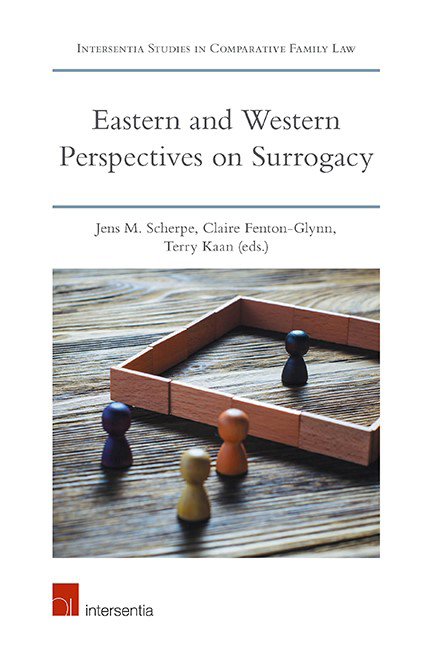Book contents
- Frontmatter
- Preface and Acknowledgements
- Contents
- List of Contributors
- Introduction
- Questionnaire
- PART I WESTERN PERSPECTIVES
- THE PROHIBITIVE APPROACH
- THE TOLERANT APPROACH
- THE REGULATORY APPROACH
- THE FREE MARKET APPROACH
- THE INFLUENCE OF INTERNATIONAL COURTS
- PART II EASTERN PERSPECTIVES
- THE PROHIBITIVE APPROACH
- A TOLERANT APPROACH?
- REGULATION THROUGH PROFESSIONAL MEDICAL BODIES
- FROM FREE MARKET TO REGULATION
- PART III COMPARATIVE PERSPECTIVES ON SURROGACY
- Index
- About the Editors
Introduction
Published online by Cambridge University Press: 26 June 2019
- Frontmatter
- Preface and Acknowledgements
- Contents
- List of Contributors
- Introduction
- Questionnaire
- PART I WESTERN PERSPECTIVES
- THE PROHIBITIVE APPROACH
- THE TOLERANT APPROACH
- THE REGULATORY APPROACH
- THE FREE MARKET APPROACH
- THE INFLUENCE OF INTERNATIONAL COURTS
- PART II EASTERN PERSPECTIVES
- THE PROHIBITIVE APPROACH
- A TOLERANT APPROACH?
- REGULATION THROUGH PROFESSIONAL MEDICAL BODIES
- FROM FREE MARKET TO REGULATION
- PART III COMPARATIVE PERSPECTIVES ON SURROGACY
- Index
- About the Editors
Summary
The issues arising out of surrogacy are global ones. Whether one approves of surrogacy or not (or indeed just some forms of it), it is a simple fact that there is a global surrogacy market, and people are making use of it. Jurisdictions therefore cannot avoid taking a position on surrogacy, and the aim of this volume is to canvas and analyse how jurisdictions worldwide have reacted to the ‘phenomenon’ of surrogacy in general and international surrogacy arrangements in particular, and then to draw some comparative conclusions.
For this it is necessary to look at both ‘Eastern’ and ‘Western’ jurisdictions (being aware of how difficult, imprecise and even inappropriate such categorisations can be). Much of the legal research undertaken so far is focused on what can broadly be called ‘Western’ jurisdictions. Some of these jurisdictions are what can be called ‘receiving jurisdictions’ with regard to surrogacy, meaning that couples from these jurisdictions often turn to international surrogacy as a result of the very restrictive legal rules on surrogacy in their home jurisdictions. By contrast, several of the ‘Eastern’ jurisdictions are, or at least have been until fairly recently, destinations for what rather deprecatorily is called ‘surrogacy tourism’. This may be because of the permissive legal rules, or indeed the absence of legal rules, but may also be driven by differences in wealth and income, meaning that commercial surrogacy could be offered at lower rates than in ‘Western’ jurisdictions, some of which also have very permissive rules on surrogacy. In addition, the cultural differences regarding the concept and importance of ‘family’ can also justify drawing a distinction between ‘East’ and ‘West’, and so the book was divided in this way.
One of the main aims of the book and research project is to look at how the global surrogacy market has had an impact on the law in different jurisdictions and different societies – and in particular, how legislatures have reacted to the social and political pressures resulting from the realities of surrogacy in a globalised world.
- Type
- Chapter
- Information
- Eastern and Western Perspectives on Surrogacy , pp. 1 - 6Publisher: IntersentiaPrint publication year: 2019



